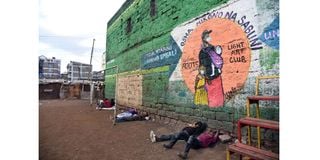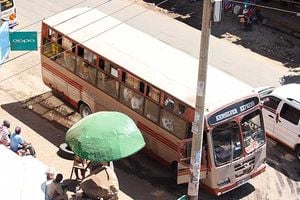Nairobi’s informal settlements and Covid-19

People rest in front of a with a message encouraging people to wash their hands in Mathare slums,Nairobi, on April 11,2020 to control the spread of Covid-19.
What you need to know:
- In the past few weeks, the numbers of confirmed Covid-19 cases have continued to spike.
- Nairobi County remains the country’s Covid-19 epicenter
Nairobians living in informal settlements are struggling to maintain the Covid-19 safety measures set by the government.
In the past few weeks, the numbers of confirmed Covid-19 cases have continued to spike. Health Cabinet Secretary Mutahi Kagwe has previously raised concern on the spread of Covid-19 in informal settlements due to congestion of people living there and lack of proper sanitation.
The UN-Habitat raised the alarm on April 2020. They shared concern that the impact of Covid-19 will be most devastating in poor and densely populated urban areas. Globally, about 900 million people live in slums and if you include people residing in other informal settlements, the number rises to 1.6 billion people. This represents a quarter of the world's urban population.
Nairobi County remains the country’s Covid-19 epicenter. According to Kenya National Bureau of Statistics, Nairobi has a population of over 4.3 million people with 1.5 million residing in slums.
Wearing face masks
Mask wearing is one of the safety measures outlined by the Ministry of Health to curb the spread of the virus. Those found flouting the rule risk to be fined Sh20,000 or face an imprisonment of a period not exceeding six months or both. But majority are not wearing masks in the slums.
For those wearing the masks, some are not wearing them properly, either they are not covering both the nose and mouth, while others are putting them around their necks.
Dhahavi, a sprawling slum in the heart of Mumbai has a population of 1 million. Social distancing is a nightmare because the shacks are built close to each other. Just like Kenya’s informal settlements, most residents were not adhering to the set COVID-19 preventative measures.
Lack of water, poor sanitation and high population factors hindered the residents from following the drastic measures.
India’s government worked hard to stop the spread of COVID-19 transmission by increased testing in the slum. Health care workers and doctors walked door to door offering testing and treatment services to the people.
Contact tracing
The robust system of contact tracing, isolating, quarantining infected cases and educating residents about Covid-19 was a successful intervention that received praise from World Health Organization officials.
The UN humanitarian agency World Food Programme states that in Kenya 1.7 million people living in informal settlements have been affected by Covid crisis. Since the easing of Covid restrictions, schools have gradually re-opened and the ban on bars and entertainment spots was lifted.
Many Kenyans have resumed normalcy and are barely following the set health guidelines in curbing the spread of Covid- 19.
The people living in slums and other informal settlements are at the highest risk of contracting the virus. If they fail to take heed of the set protocols, Kenya risks going the India way, where after lifting lockdown measures in the populous Dharavi slum, there was a spike of Covid-19 cases in mid-June. Kenyans should continue to take caution because we are not out of the woods yet.
Ms Ayuma is a communications and journalism student at Maasai Mara University. [email protected].




